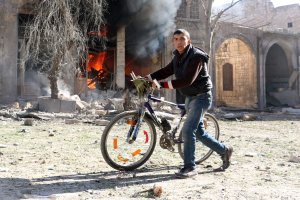Days of heavy airstrikes have left Syria’s rebel-held eastern Aleppo without a single hospital operating at full capacity, the Syrian American Medical Society told CNN on Saturday.

A number of major trauma hospitals were knocked out of service during recent attacks, according to the medical society.
However, activists working in the city said up to five other hospitals in eastern neighborhoods are still functioning.
“For the first time, eastern Aleppo is out of hospitals operating at full capacity,” said Dr. Mazen Kewara, director of the medical society’s Turkey office. “There are remaining medical facilities, but they are not operating at full capacity.”
One of those hit was a children’s hospital, forcing staff to evacuate babies to safety.
Hospitals are desperately needed as an estimated 250,000 people remain trapped while the Syrian regime bombards the city’s rebel-held east, which faces dwindling reserves of food, fuel and medical supplies.
On Saturday, at least 38 civilians were killed by the extensive bombardment of eastern Aleppo, according to the Syrian Civil Defense, a volunteer group also known as the White Helmets. The barrage included 250 airstrikes and more than 2,000 artillery rounds.
Powerful video footage that the activist group Aleppo Media Center posted online showed what it said was the immediate aftermath of a bombing at eastern Aleppo’s M2 hospital on Friday evening.
A man covered with dust and blood is carried past a body toward a stairwell filled with rubble and splintered wood. Another bandaged, dust-covered patient follows holding what looks like his own IV drip. Patients confined to bed are given face masks to cope with the dust.
A man who appears to be a doctor tells the cameraman, “Everyone in the hospital got injured, even already injured patients have been injured again, God help us.”
Another man who seems to be a doctor says the hospital was bombarded, and there has been a direct hit on the intensive care unit, which he says was full of patients, “(especially) those who were transferred from hospitals that have been struck today morning and yesterday evening.”
He says staff have had to transfer patients to other hospitals when they don’t even know if they are operational, adding “the material damage is so huge in the hospital, unbelievable horror among patients and the medical staff, the ambulances outside can’t rescue patients, people can’t rescue each other, people are afraid of coming to the hospitals.”
The humanitarian group Doctors Without Borders condemned the airstrikes, saying entire hospitals, electric generators, emergency rooms and wards have been destroyed in eastern Aleppo in more than 30 attacks since July.
“It is not only MSF that condemns indiscriminate attacks on civilians or civilian infrastructure, including hospitals, but also humanitarian law,” said Teresa Sancristoval, emergency coordinator for the group also known as Médecins Sans Frontières.
“The message is simple, and I don´t know how to say it any louder: Stop bombing hospitals.”
In Washington, national security adviser Susan Rice said in a statement: “The United States condemns in the strongest terms these horrific attacks against medical infrastructure and humanitarian aid workers. There is no excuse for these heinous actions.”
Patients, hospital staff injured
An activist with the Aleppo Media Center told CNN on Saturday that up to five hospitals are now operating in the northern Syrian City.
The group said there were minor injuries to patients and staff at the M1 surgical hospital after artillery shelling and airstrikes that caused major fires Friday.
At a second facility, the al-Hakim children’s hospital, the group told CNN that medical crew and children were evacuated with no injuries and that all babies survived the attacks.
The UK-based monitoring group the Syrian Observatory for Human Rights said Saturday that some hospitals struck in recent airstrikes were out of service for a time but are now operating to some extent.
Neighborhoods bombed
Syrian government aircraft resumed airstrikes Tuesday in Aleppo after a relative lull of three weeks.
The Syrian Observatory for Human Rights said Friday that more than 1,000 people have died in airstrikes and shelling across Aleppo and surrounding areas since a short-lived U.S. and Russian-brokered ceasefire broke down on Sept. 19.
Syria’s grinding five-year conflict has devastated the city, divided between government-controlled areas in the west and rebel positions in the east.
Moscow has sought to distance itself from the latest blitz, with Deputy Foreign Minister Sergey Ryabkov saying this week that the Russian air force had not carried out the Aleppo strikes, according to state-run news agency Tass.














